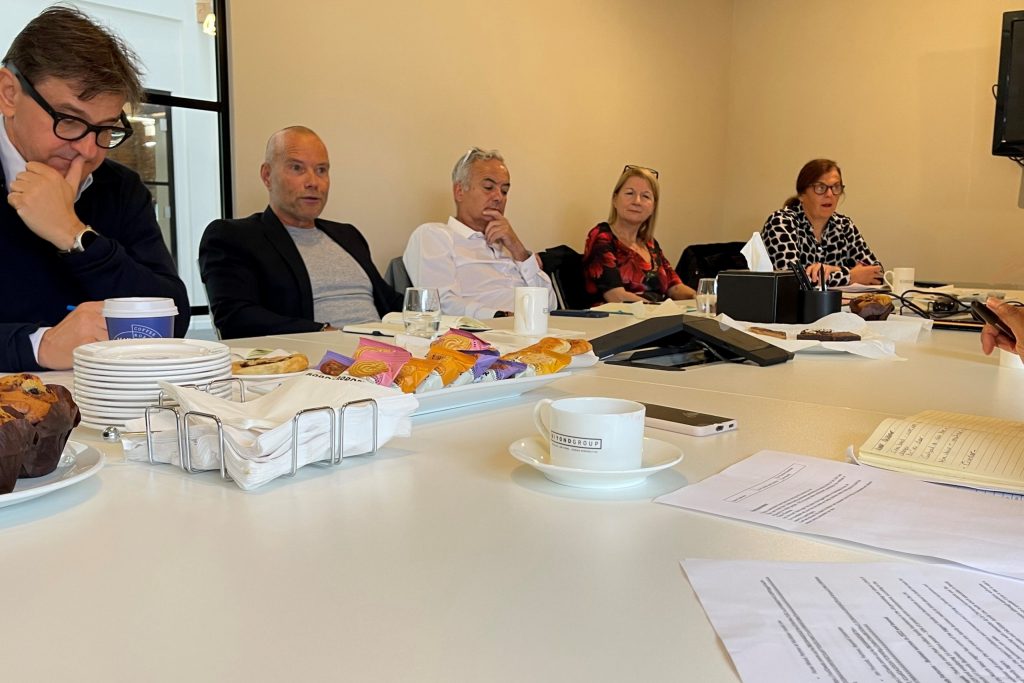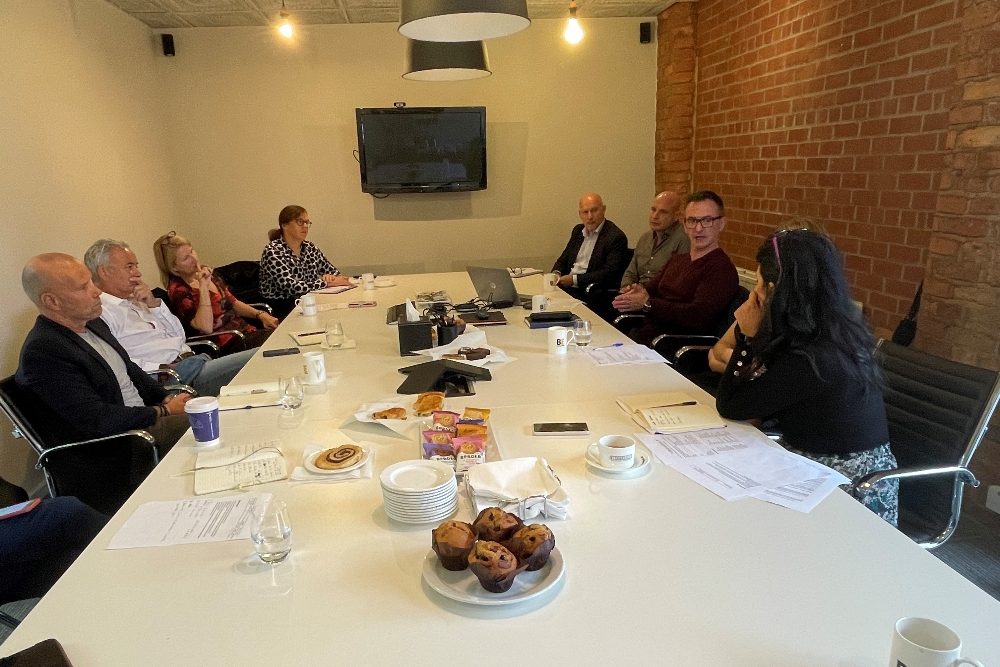Planning is key when it comes to family business matters

The unprecedented events of the past six months have presented family businesses with immense challenges.
While many North West companies have demonstrated significant resilience amid the current economic uncertainties — the rapidly changing economic climate has been a wake-up call for business leaders looking towards the future.
In our latest roundtable in partnership with Alexander & Co, Beyond Corporate and McAllister Family Law, we heard from leading family businesses across the region on how they are preparing for the future of their family business while also leaving a legacy for future generations.
In attendance were John McCaffery, Partner, Alexander & Co; Matt Fleetwood, CEO, Beyond Corporate; Fiona Wood, Partner, McAlister Family Law; Matthew Hall, Butlers Farmhouse Cheeses; Antony Bennett, Managing Director, Barry Bennett; Jonathan Kane, CEO, Kane International; Emma Guy, Director of sales operation, Aqueous; Jonathon Seddon, CEO, Seddon; alongside Sue Howorth and Dave Clarkson, co-founders, The Family Business Community.
Antony Bennett, Managing Director at Barry Bennett, a leading supplier of DSA equipment throughout the UK, took over the family business when his dad Barry retired last year having founded the business 51 years ago.
Talking about the future, he said: “We have four businesses, and my son has now come into one of those, while I lead the main business. As to whether he wants to take over from me one day, we are yet to see because he may want to, or he may not.
“You do get to a stage where you start thinking how long am I going to do this? Do I sell and hand the money down or keep going?
“It is about looking at the future and looking and what that holds.
“A lot of our work is government funded. Most of our work comes from the Disability Student Allowance and if the government decided to change policy or remove that funding from students to institutions such as universities, then that will have a devastating impact on our main business.
“I am thinking about that long-term all the time as those changes will have a bigger impact on the future of the business in the next few years as it could mean that I need to sell up.”
Seddon Construction has been operating for 125 years and Jonathan Seddon is the latest generation at the helm.
The original Seddon Group was split into three businesses in 2012 with ownership passed down to Jonathan, his sister Nicola, and his brother Jamie.
Jonathan said the company took all the right steps to ensure a smooth split of the business, starting with the engagement of a family business adviser.
He said: “Our success relied on all three families remaining within the business with aligned goals and working together as one.
“We were able to do it because the business didn’t have any debt. We didn’t sit around a table with lawyers and accountants about how we were going to split our balance sheet, we trusted that we can.
“What we didn’t have prior to doing that, and what we have now, is a family rule book, family council, reserved matters and so on that makes us all accountable for our actions.”
He added: “We have created a workplace culture and values that we also follow because we have 700 people, and our behaviour also matters.”
Matthew Hall is fourth generation owner of Butlers Farmhouse Cheeses, which he bought into 10-years ago alongside his brother Daniel.
Matthew said it has taken a few years to work through a change of dynamics when he and his brother decided to lead the business.
He said: “We had a whole group of people who were in their 50s and who have also been with my parent’s team for 30 years and had a whole heap of experience, and then came in and started working alongside them, and that created a strange dynamic at first.
“But we have moved on from that and we are now going forward with a strong culture. So, we are on the next stage of growth and focusing on that.
“We’re also aware the next stage down probably won’t keep going into cousins so, at some stage, we will split again, and have one entity that works for Daniel and one entity that works for me and we will keep going down the first and second generation route, but as one entrepreneurial family.”
Jonathan Kane, CEO of Kane International, a manufacturer and supplier of hand-held exhaust emissions testers, commented that even with the best planning in place for future growth and succession, leaders must be realistic about change.
He added: “I’ve got three children and I’m lucky enough to be quite fit and able to work for some period of time.
“So, I am almost 57 and I’ve mapped out that I’m going to be doing this probably until I’m 70 with a view to giving the kids as much space as they need to determine if any of them are interested in joining the business. And then at the age of 70, if I’m assuming I’m here, I will then be looking to make a call as to what I do next.”
He added: “I run the business with my brother and we’re very close. We are also very challenging of each other but overall, that’s a force for good because it does help you clarify what it is that you’re trying to do when you’re trying to run your business.”
Emma Guy, director of sales operation at digital marketing firm, Aqueous, said as a small business family values run through the heart of everything they do.
“My son and daughter have joined the company, but there’s only 30 of us and so the team have become part of the family and part of our culture.
“We all work together towards a common goal, and as we grow, we want the business to have that family feel and that connection of emotion and challenges.
“And so, for me, how do you keep that family feel of a business when you start to grow?”
Exploring the current challenge facing family businesses, John McCaffery, Partner at Alexander & Co, said tax is still pervasive and businesses need to think about how they pass their wealth on.
He said: “I’ve seen situations where 40% of the business value has been taken away in inheritance tax and that can have a massive impact on how a business moves forward. So, planning is key.
“Every family business needs its own plan, and a set of rules because at the end of day you’re in charge of a business with commercial aims and when family squabbles takeover, that’s when it all starts to go wrong.
“But forward planning can help resolve issues much sooner, and help businesses pass on their wealth in a tax efficient way.”
Fiona Wood, Partner at McAlister Family Law, said many entrepreneurs were beginning to think about protecting the family business from the potential disruption of a divorce.
She said: “Shareholder agreements and even pre-nuptial agreements can spell out what should happen if there is a fall out between family members or a husband and wife.
“We are seeing more entrepreneurs feel the need to ring fence things such as their shares in the company should a relationship break down or parents of children entering the business wanting the next generation to protect their assets.
“They are difficult conversations to have, but as John said earlier, planning is important. A lot of people start and grow their business organically without giving this much thought because they’re busy running a company. But often, when a relationship breaks down, splitting assets can get complicated because agreements haven’t been put in place.”
Matt Fleetwood, CEO, Beyond Law Group, said the generational aspect of a family business is the biggest determinant of what happens to the future of that business.
“The generational thing is the biggest changing factor for people in family businesses, because now, more so than ever, it’s highly unusual for children who are working in second and third generation family businesses to take on that business.
“In my view the reason for that is that by the time it’s gone to second and third generation, the whole wealth structure, and the whole lifestyle of that family has changed. That’s because there would have been a level of wealth that has been built up which enables the next generation to have a level of comfort which means they can go on to do other things.
“Where I have seen it working well is when a son or daughter that hasn’t done so well in their career outside of the family business, then chooses to go into that business.”
Dave Clarkson, co-founder of The Family Business Community, noted that writing down the family values and shared vision of the business was important for long-term success.
He added: “Because when you talk to your employees you want them to feel part of the family and connected to the family because you have created an overall family set of values that everyone is now working to.”







